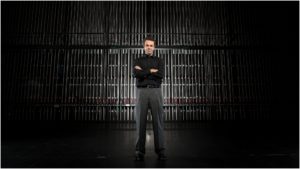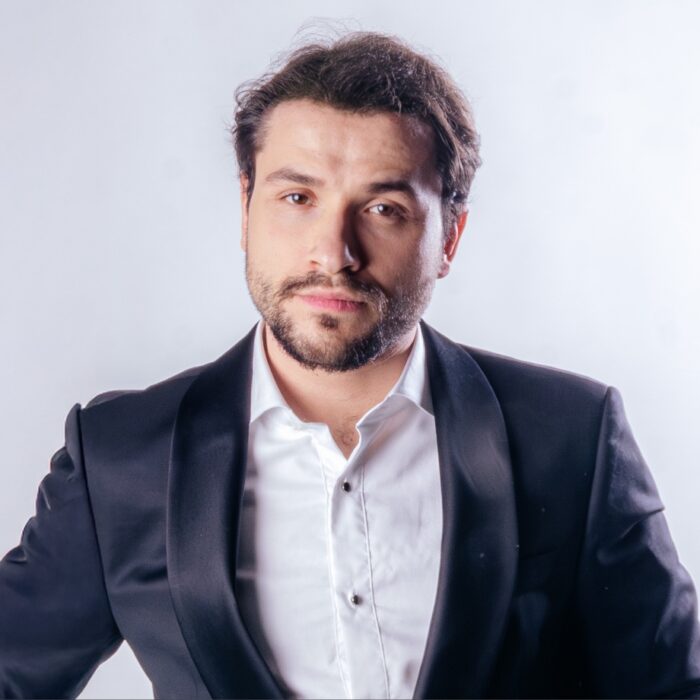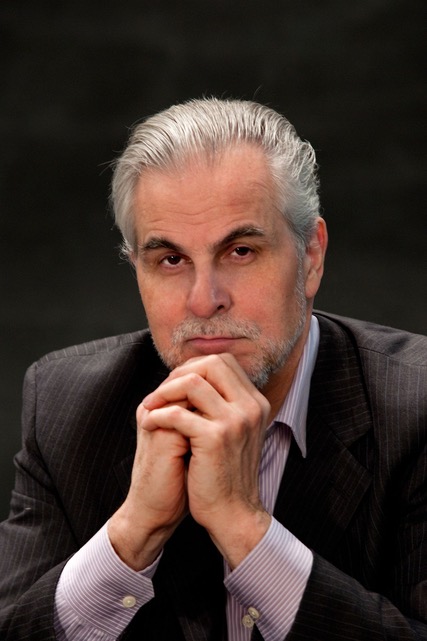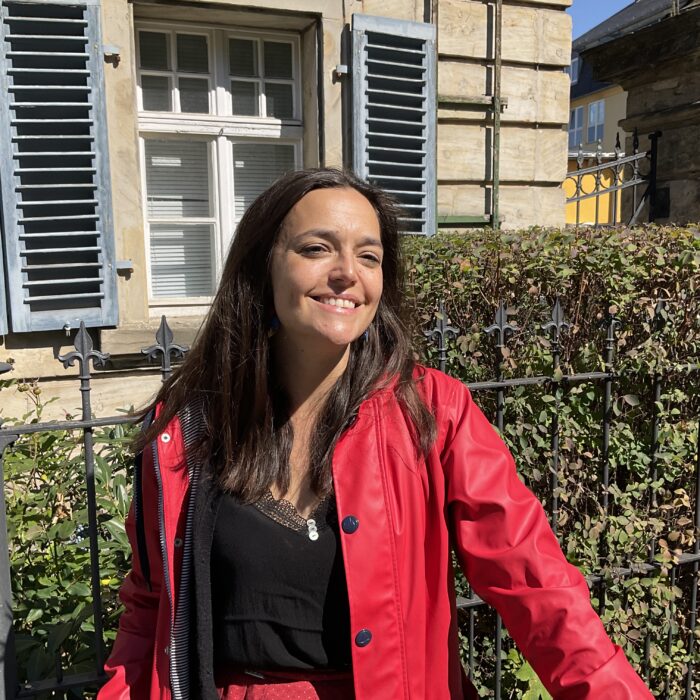
Q & A: Atlanta Opera Artistic & General Manager Tomer Zvulun on the Courage & Imagination of Making Opera into a Circus
By Chris RuelThe Atlanta Opera (TAO) website greets visitors with an invitation: “JOIN US AT THE BIG TENT!” Cool. The company’s staging its 2021 productions in an enormous tent.
But wait a minute; is that a circus tent?
Yes, it is, and unlike the Met’s new-ish production of “Così fan tutte” in which the circus entered the opera house, The Atlanta Opera’s 2021 season brings opera into the circus tent to create the Molly Blank Big Tent Series. The Big Tent opened with an obvious choice: Leoncavallo’s “Il Pagliacci” on October 22.
TAO’s Carl W. Knobloch, Jr. General & Artistic Director, Tomer Zvulun, along with the company’s board of directors, saw an opportunity to “not waste a crisis.” One of the first things TAO did in response to the pandemic was to turn their costume shop into a mask and other personal protective equipment-making operation for local hospitals. In return, the hospitals and their leading doctors enabled TAO to get back on its feet, forming a Health & Safety Task Force led by renowned epidemiologist, Dr. Carlos del Rio.
Israeli-born Zvulun has served at the helm of the company since 2013 and is an accomplished stage director with works presented on opera’s premier stages in the United States and abroad. He spent seven seasons directing staff at the Met and is a frequent guest conductor at the Seattle Opera, The Dallas Opera, Houston Grand Opera, and Israeli Opera. Zvulun has directed over 15 new productions at TAO, his home company. These include “Dead Man Walking,” “Flying Dutchman,” and “Silent Night,” and standard repertoire favorites, “La Bohème,” “Lucia di Lammermoor,” “Madama Butterfly,” and “Magic Flute.”
As Zvulun relates in his conversation with OperaWire, TAO’s guiding principles include courage, innovation, and magic. Zvulun’s reimagining of the 2021 season puts those principles on full display. The company has six productions planned six for the season: “Pagliacci,” “The Kaiser of Atlantis,” “Mack the Knife: An Evening with Kurt Weill,” “Mezzo Extravaganza,” and “Crossroads: A Variety Show.” With such a broad program, TAO is poised to build its audience amid a pandemic. TAO’s courage and innovation led to the Big Tent Series.
The magic will follow with shows filled with some of opera’s brightest stars, including Jamie Barton, Daniela Mack, and Alek Shrader. TAO’s opera circus promises fun spectacle (think unicyclists, stilt walkers, dancers, and jugglers) during a dark time.
OperaWire: COVID-19 changed everyone’s plans, so we know the root cause of the pivot to the Big Tent; but when and how did the idea surface?
Tomer Zvulun: It started on basically on March 13, 2020. We had to cancel the final few performances and realized quickly that not only we were canceling shows, but the rest of the 2019-2020 season and that the 2021 season was in jeopardy. Very early on, our board of directors wanted us to come up with a plan once it became clear that the 2021 season may not happen indoors.
Performing shows under a tent with the walls removed so that fresh air can flow in and out started germinating in my mind and in my colleagues’ minds. We started fleshing it out, pricing it out, and thinking about appropriate pieces we could do within that tent.
I think if you look at the past eight months, we’ve received so many bits and pieces of information accurate at the time, but now aren’t. One thing is super clear, and it’s always been super clear; performances outdoors are safer than performances indoors. Based on that idea, we started thinking about what would work in this location and with our climate. And that’s how it all started.
OW: Kicking off the season with “Pagliacci” will undoubtedly create a very meta experience — a circus within a circus. It’s a multilayered concept, isn’t it?
TZ: That’s the idea behind it. Art imitates life and life imitates art. You don’t know when the play ends and when the life of the performance begins and ends. It’s not a coincidence that we chose the circus tent. The circus encapsulates an idea, and it represents is grit and perseverance.
If you look at history during the worst of global times — other pandemics, the Great Depression, and World War II — artists were nimble enough, stubborn enough, and desperate enough to gather their courage and keep on connecting. The circus always pitched their tent at the railroad station, regardless of how terrible the world was. And that’s the ethos of what we’re trying to do.
OW: Tell me about “The Kaiser of Atlantis.” The writing of the opera has an incredible backstory.
TZ: “Kaiser” happens in a circus as well. One of the leading characters in “Kaiser” is the Harlequin, which is a clown. How I look at “Kaiser of Atlantis” is in the context that it was made. The opera was created during the Holocaust in a labor camp, written by people who were incarcerated under a regime that disregarded artists.
And what was so unique about “Kaiser” is that those artists found a way, despite everything going on in the world, to come together as a team and create a brilliant parody about a world where an emperor makes a pact with death. The emperor realizes that the more deaths he’s responsible for, the more power he’ll have until death decides to break his sword and not cooperate anymore.
The question in “Kaiser,” and the historical question of the time in which it was created, was how do artists persevere? How did they go on despite everything that is going on in the world? And that’s exactly the question that we’re facing right now. Art should not disappear when things get bad. Across history, artists have found ways to connect, and that’s especially important during a crisis.
OW: What steps has TAO taken to safeguard the health of all involved?
TZ: The toughest obstacle we had to encounter was the courage to do it because we were walking into this with eyes wide open. We then had to convince constituents from the board of directors to the artists and audience that we were very serious. We gathered an incredible group of epidemiologists and world-class public health doctors to form the Health & Safety Task Force led by Dr. Carlos del Rio, the premier infectious disease professor in the Southeast. We’ve been working with the Task Force for the past six months and have 37 pages of safety measures, which we follow meticulously.
We hired an amazing risk mitigation coordinator recommended by Dr. del Rio, who is here the whole time. She makes sure there’s intermittent testing of the performers. We require everybody to have a test every week and then divided into different groups of risk.
Besides the sides of the tent being open, singers perform in masks unless they have barriers separating them from the audience and from other performers. The only time they may remove the mask is when they are at least 15 feet away from other people. And even then, we are extremely careful.
OW: A follow-up question popped into my mind as you were speaking: How did you locate and then onboard your health experts?
TZ: I’m wearing two hats. One is the artistic director, and the other is the general director. As part of my duties as general director, I worked with our board members who are very well connected in the community. A lot of them have expertise in public health, medicine, and in legal matters. One member of our board introduced me to Dr. del Rio. When I presented the idea to him, he was extremely excited. We then expanded the safety team to include the CEO of Grady Hospital, John Halpert, who is a big fan of opera.
The relationship with the hospital and health workers developed because of the pandemic. The first thing we did when COVID-19 happened was to convert our costume shop to manufacture masks and personal protective equipment for Grady Hospital. That relationship developed to the point where they asked, “What can we do to help you come back and perform safely?”
One of the most moving moments in this entire process happened when we looked at all the measures that needed to be taken and all the expenses involved. I asked Dr. del Rio in early June — before we announced all this — if he thought we were nuts. He said, “Well, music is kind of a medicine. And when you prevent people from enjoying live performances and music for such a long time, there’s damage. What you’re doing here is so important because you’re figuring out a way to allow for live performance.”
There is only so much benefit you can get from streaming before it becomes old. There’s no comparison to being outside and seeing the spectacle of the operas that we’re putting together.
OW: There’s a genuine opportunity for audience building, isn’t there? You have a program that is very broad and can appeal to non-operagoers, a tent in which an audience can feel safe, and a public that’s champing at the bit to experience live performances again.
TZ: You don’t waste a crisis, and this crisis created an opportunity for real collaboration with circus art. The productions feature jugglers and unicycles and clowns and stilt walkers. And so, audiences will see the spectacle of opera that by necessity now lasts no more than an hour and a half. I think those who are slightly scared of a long, boring evening in the theater or who haven’t experienced opera will be drawn to a shorter performance when there’s a spectacle that involves so many art forms around them.
OW: How does the Big Tent Series align with The Atlanta Opera’s long-term goals and mission?
TZ: Our vision is basically two words: Reimagine Opera. Boom! Do I need to say anything else? Reimagine Opera. We believe that a major international city like Atlanta deserves a major international opera company. We’re gathering some of the greatest singers in the world and putting them in a freaking tent with a mask on their faces wearing clown makeup. They’re in the middle of this bigger than life creation.
If you look at our seven values, some of the most important ones are courage, innovation, and magic. When we realized that what we were doing with the circus tent was reimagining opera, it placed courage, innovation, and magic right in front of our eyes.
OW: Do you have any parting thoughts for readers?
TZ: There’s something important to me, something very important. I’m a strong believer in stoic philosophy, and I’m a strong believer that you do everything you can to work with the circumstances. But ultimately you can’t control what happens. We’re accepting the circumstances, which are horrifying. There’s a pandemic, an economic meltdown, a mental meltdown of the community, and a meltdown in the industry.
This industry is battered. It’s really struggling right now, and what we’re doing is finding ways within the restrictions to move forward with courage and imagination. Regardless of the outcomes, we try to do the right thing; the right thing for the art, the right thing for the community, and the right thing for the artists.



